Cat spraying (also called urine marking) is a natural behavior exhibited by many domestic cats of both sexes, although it’s more common in unneutered male cats. Cat spraying involves releasing small amounts of urine onto vertical surfaces, including door frames, furniture, and walls, rather than using the litter box. The behavior is also typically accompanied by the distinct smell of cat urine.
Cats spray for a variety of reasons, including territorial marking, hormonal influences, stress and anxiety, and medical problems like urinary tract infections or bladder issues. Cat spraying generally happens against a vertical surface such as a garden bush, a door frame, or a wall inside your home, whereas cat peeing is usually directed into a litter box or a scrape in the garden soil.
Although unneutered male or Tom cats are typically more guilty of spraying than neutered cats of both sexes, desexing your cat will probably reduce your pet’s motivation to spray. However, it is estimated that around 10% of neutered males and 5% of spayed females will continue to spray.
Unfortunately, once the smell of cat pee is in your carpets or upholstery, it’s virtually impossible to shift. So, if your cat’s spraying behavior drives you crazy, you must read this comprehensive guide to learn why your cat sprays and, more importantly, what you can do to stop it!
What Is Cat Spraying?
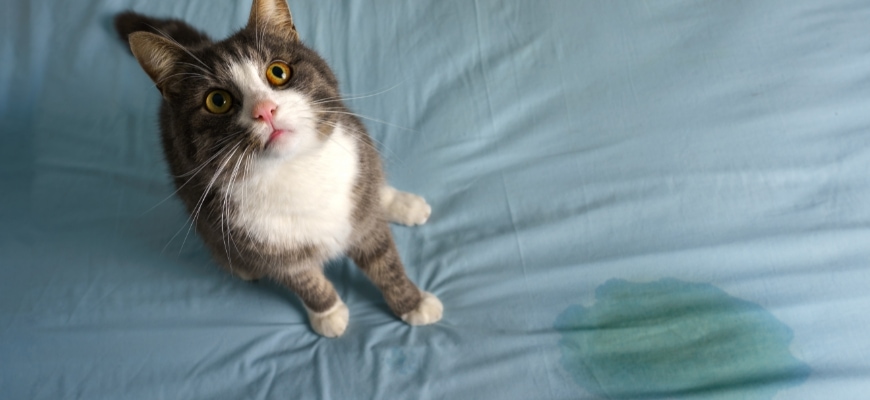
Cat spraying or urine spraying is typically a cat’s way of marking his or her territory and is a normal behavior used to reduce the chance of conflict with other cats. Unfortunately, cats usually choose vertical surfaces in prominent places to spray, such as trees and bushes in your garden and furniture and walls inside your home.
The cat backs up to a vertical surface and releases a small amount of pee. Unfortunately, because of the additional pheromones the pee contains, sprayed urine is usually much more pungent than urine in the litter box.
At What Age Do Cats Start Spraying?
Cats of both sexes usually start spraying when they reach around six months of age as they reach sexual maturity. Fortunately, both my cats were desexed before they began marking out in the garden, and thankfully, they never sprayed in my house.
Cat Spraying Vs. Peeing – What Is The Difference?
When your cat empties her bladder, she’s peeing. However, if the cat uses small squirts of urine to deposit her scent, she’s spraying. Generally, when a cat backs up to a vertical surface with their tail upright and squirts a small amount of pee, that’s spraying. Often, the cat’s tail quivers when she sprays.
Regular peeing or urination is when the cat squats to pee on the litter box, a flowerbed, the floor, or some other horizontal surface.
Why Do Cats Spray?
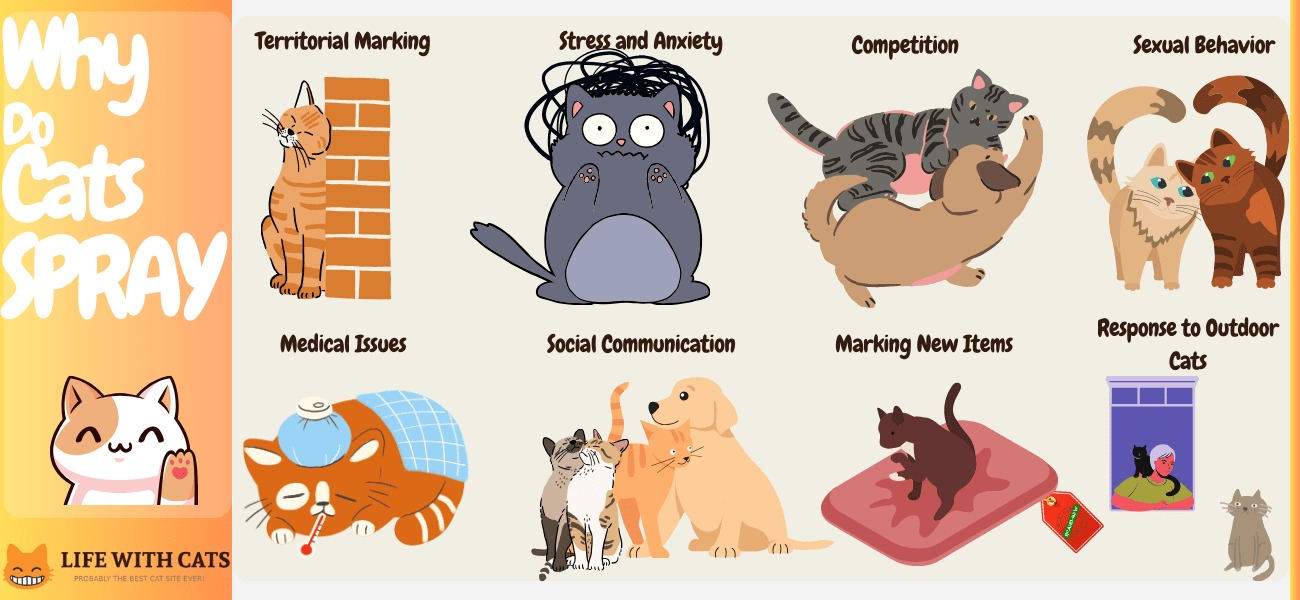
Cats spray for various reasons, and it’s perfectly normal behavior, so there’s no need to panic if your cat does it unless the spraying happens to be up the side of your best sofa!
So, let’s dive in and find out just why cats spray!
Territorial Marking
Urine spraying is a normal part of your cat’s scent-marking behavior and is used by cats to create a different scent map of their environment.
Cats tend to rub their cheeks in the part of their territory where they feel safest and most relaxed. However, your cat uses spraying to scent the areas of her territory where she feels threatened, possibly by other cats or wild animals, as a reminder to be wary in that part of her patch.
When the smell fades away, the cat sprays again to top up the warning scent.
Stress And Anxiety
Cats sometimes spray when they are stressed or anxious about something in their immediate environment, such as a change in routine, new pets or people in their home, or remodeling or construction work taking place.
Competition
Cats use urine spraying as a means of communicating with each other. If one cat in a multi-cat household feels that one of her housemates is muscling in on her space or trying to compete for resources, such as food, litter boxes, toys, etc., she might spray urine as a warning to back off.
Sexual Behavior
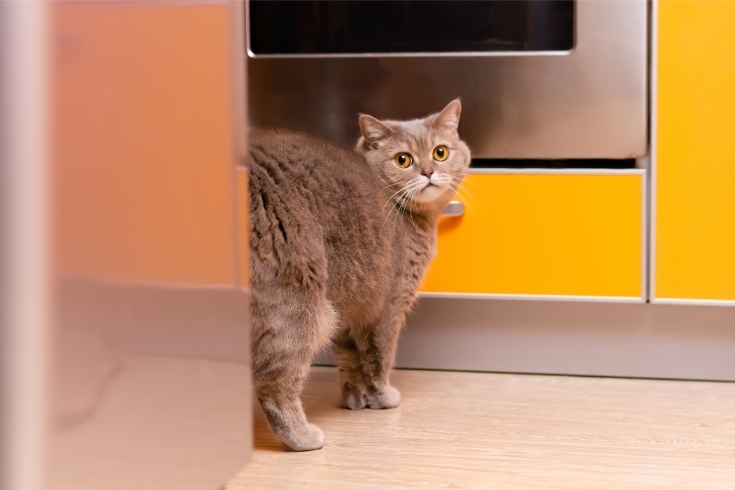
Cats reach sexual maturity at around six months of age. Urine spraying is more common in intact or non-neutered male cats, although female cats can do it too. Intact male cats usually spray to attract mates or communicate with female cats in the area.
Medical Issues
The first thing to do if your cat starts spraying is to take her to the vet clinic to rule out any underlying medical issues.
The vet will probably recommend a complete blood count, chemistry, and urine analysis tests to look for possible medical conditions, including bladder stones, urinary tract infections, kidney disease, and crystalluria.
If one of those conditions is diagnosed, treatment of the problem should help reduce the spraying.
Social Communication
As mentioned earlier, cats use spraying as a way of marking their territory, advertising for mates, and warning off potential resource competitors. That forms an important means of social communication that helps cats “talk” to each other, like a feline Instagram!
Marking New Items
Sometimes, a cat will spray on something new in the home, essentially to mark it as theirs. That could be a new chair, new garden furniture, or anything that offers a vertical surface.
Response To Outdoor Cats
If an outdoor cat invades an indoor cat’s home, the indoor cat might spray to warn off the intruder, and the same can apply.
For example, we have a large male cat that lives in our neighborhood, and he regularly wanders through our garden, spraying as he goes. Once, I left the back door open, and the invader came into the house and sprayed up the kitchen cabinets before I could stop him! Thankfully, our new puppy quickly discouraged the unwelcome visitor by chasing him a few times, and we haven’t had a problem since!
What Are The Signs Of A Cat Spraying?
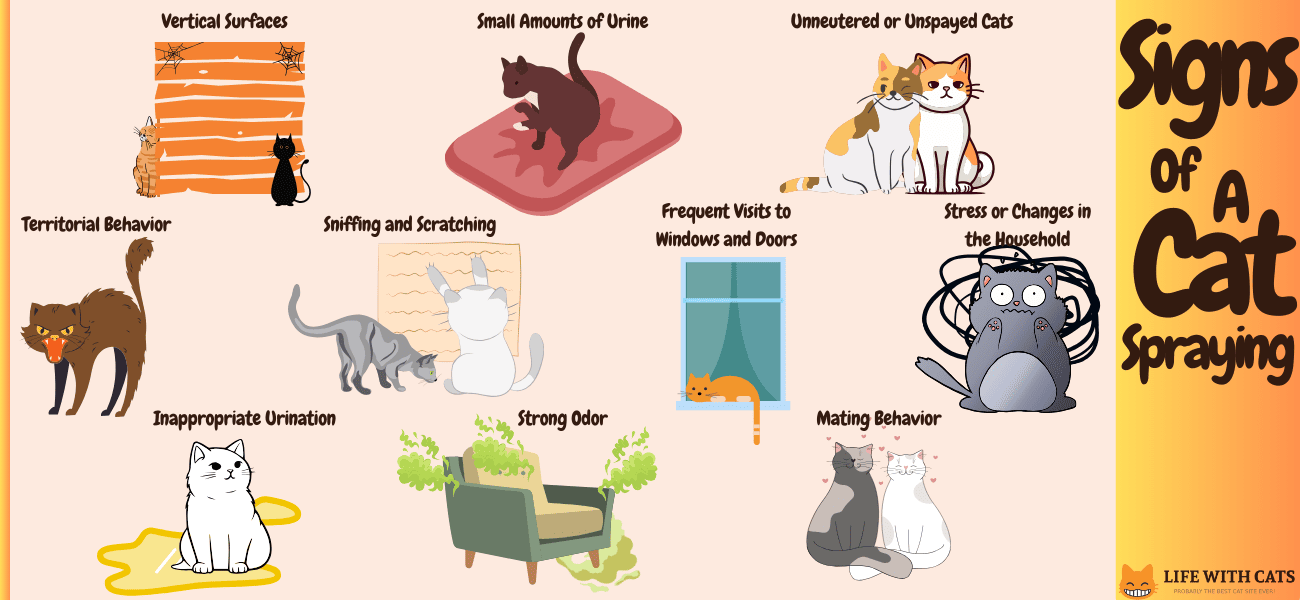
The signs of a cat spraying are pretty typical and easy to recognize. Standard spraying signals include peeing up vertical surfaces, only peeing tiny amounts of urine, other territorial behavior, and a pungent odor.
Here’s how to tell if your cat is spraying.
Vertical Surfaces
One classic sign that a cat is spraying is their preference for vertical surfaces. When a cat sprays, it typically backs up to a vertical object such as a wall, furniture, or even your best curtains and releases a small amount of pee. This behavior differs from regular urination, where a cat squats to relieve itself.
When a cat sprays, its tail typically quivers, and a small amount of pee is sprayed onto the surface, often leaving noticeable marks and a highly pungent, distinctive smell.
Small Amounts Of Urine
Unlike regular urination, where cats empty their bladder, spraying involves releasing less urine. The pee is usually more concentrated and has a very strong smell, which allows the cat to mark their territory and communicate with other cats in the area.
Unneutered Or Unspayed Cats
Unneutered male cats and unspayed female cats are more likely to spray. Hormones play a significant role in this behavior, and intact cats are more inclined to mark their territory and attract potential mates through scent marking.
Territorial Behavior
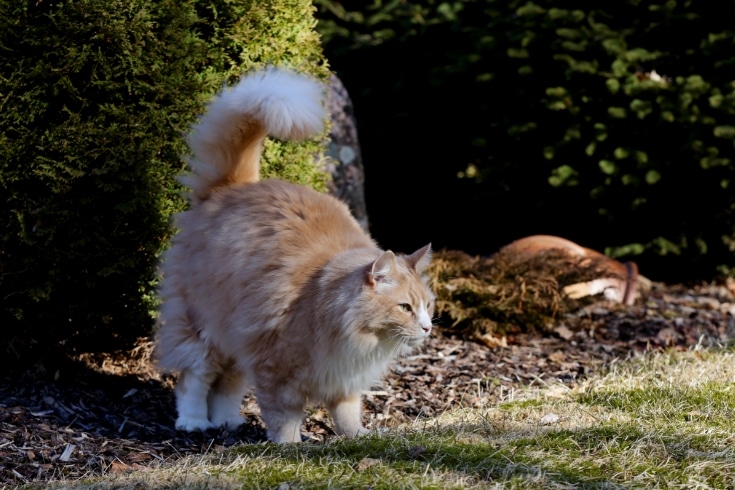
A cat-marking territory is often achieved through spraying. Cats spray to mark their territory and communicate with other cats. When the cat sprays, it leaves a scent marker telling other cats, “This is my territory!” This behavior is especially common in multi-cat homes and neighborhoods with much cat traffic through backyards.
Sniffing And Scratching
Before spraying, a cat might sniff around, especially the areas they consider marking. They might also scratch nearby surfaces to mark their territory further, as cats’ paws have scent glands.
Frequent Visits To Windows And Doors
Indoor cats that spray inside the home might spend time hanging around windows and doors, especially if they can see or smell other cats outside. That behavior is linked to the cat’s territorial nature and the need to protect her space from potential intruders.
Stress Or Changes In The Household
Stressful situations or household changes can make your cat feel insecure and trigger spraying behavior. For example, bringing home a new pet, welcoming a new baby, and even having a friend move in to stay for a while can all upset your cat and disrupt her familiar routine, potentially leading to marking behavior, including spraying.
Inappropriate Urination
Spraying generally involves cats urinating up vertical surfaces, but cats experiencing urinary tract issues might also start peeing on horizontal surfaces. So, if your cat suddenly starts peeing outside her litter box, it’s important to rule out medical issues before assuming she’s spraying.
Strong Odor

Sprayed urine smells particularly strong and pungent compared to regular cat pee. The idea is for the odor to last as long as possible before it needs replenishing, and it can be incredibly difficult to get rid of.
There are some excellent enzymatic products that remove the odor and stain left by spraying, discouraging the cat from repeating the marking behavior in the same spot over and over again.
Mating Behavior
Unspayed female cats in heat and unneutered male cats looking for a mate are the prime candidates for exhibiting spraying behavior. Spraying is the cats’ way of telling potential mates they’re in the neighborhood and competing with other nearby cats.
Do Neutered Cats Spray?
Yes, unfortunately, neutered cat spraying can still be a problem for some owners.
Neutering will likely reduce the cat’s motivation for spraying, and the urine odor will become much less pungent and more like regular cat pee. However, vets reckon that roughly 10% of castrated male cats and 5% of spayed females continue spraying.
How Do You Keep A Cat From Spraying?
To keep a cat from spraying, you need to use various tactics, depending on the cat’s motivation.
For example, if your cat is still intact, he might spray to attract female cats to his backyard or to warn off competing neighborhood Tom cats. If something in your home or the cat’s environment has changed, even a spayed female cat might start spraying because she feels insecure and anxious.
Here’s an overview of some tried and tested ways of how to stop a cat from spraying.
Spaying Or Neutering
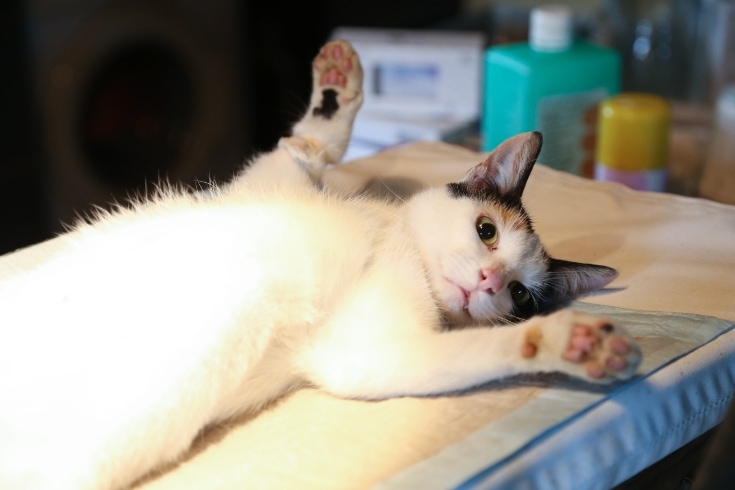
The most obvious thing to do to stop your cat from spraying is to have your pet desexed. Spaying or castrating your cat should reduce their spraying behavior and will certainly reduce the strong urine odor.
That said, even desexing your cat might not rule out spraying completely, as a small percentage of neutered felines still spray.
Clean Previous Spraying Areas
One reason cats spray is to mark a territory. So, unfortunately, the cat keeps returning to the same spot to top up their feline “signpost.”
General household cleaning products aren’t really effective against the strong smell of cat pee, so you need to call in the big guns and use an enzymatic cleaner that can neutralize the smell. That prevents the cat from returning to the same spot repeatedly and rids your home of an unpleasant, lingering pong of cat pee.
Litter Box Management
If you have a multi-cat household, you must provide a litter box for every cat you have. You should also keep the litter boxes clean and well-maintained. If the litter trays are dirty, your cats will likely start peeing elsewhere in your home.
Environmental Enrichment
Stress and anxiety can be triggers for spraying behavior in some cats, so be sure to provide environmental enrichment for your pet with interactive toys, food puzzles, and the like. If you have an indoor cat, a window seat where your pet can sit and watch the world outside can also be an excellent way of keeping your cat mentally stimulated.
Reduce Stress
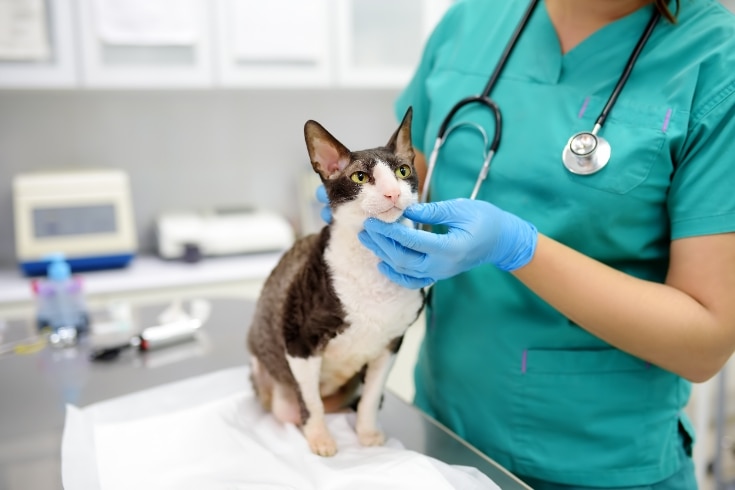
Stress can be a trigger for spraying, so try to identify what could be causing your cat’s anxiety and take steps to fix it. Typical stressors for cats include changes in the home environment, introducing new pets and new people, and changing routines.
If your cat is in discomfort due to dental problems or other health issues, that can also cause her to feel stressed. So, it’s a good idea to have your cat examined by a vet to ensure she’s not in pain or hiding an undiagnosed health condition.
Feliway Or Pheromone Products
Feliway or other pheromone products come as plug-ins, sprays, wipes, and collars and can be highly effective at calming an anxious cat, helping to remove the cat’s desire to spray. I’ve used Feliway plug-ins in my home to help my cats relax when thunderstorms are around, or fireworks are being set off, and I find that works very well.
Consult A Veterinarian
If your cat persists in spraying despite your best efforts to stop her, I recommend consulting a veterinarian. The problem could be caused by a urinary tract infection or some other health condition that requires medical attention, and once that’s fixed, the spraying will probably stop.
Behavioral Consultation
If all else fails and you cannot stop your cat from spraying around your house, I recommend a behavioral consultation with a professional animal behaviorist. A behaviorist will be able to formulate a plan and training regimen to help tackle the problem.
FAQs
In this section of our guide, we answer some of the most frequently asked questions about cat spraying, its causes, management, and prevention.
Why Is My Neutered Cat Still Spraying?
Neutering usually reduces spraying behavior, but if your cat continues to spray, it might be due to underlying medical issues, stress, or territorial conflicts. In addition, a small percentage of male and female neutered cats continue spraying, and it’s worth talking to an animal behaviorist if your kitty just won’t stop.
At What Age Should I Neuter My Cat To Prevent Spraying?
Neutering is generally effective in preventing spraying if done before sexual maturity, around five to six months of age. Many charities and rescues insist that you neuter your cat as soon as she’s old enough to prevent litters of unwanted kittens and stop your cat from straying, and your vet will advise you on when the operation can be done.
Can Changes In My Home Trigger Spraying Behavior?
Yes, changes like moving home, introducing new pets, bringing home a new baby, or simply rearranging furniture can trigger spraying since cats use scent marking to help cope with environmental changes.
Is Spraying More Common In Male Cats?
Yes, spraying is more common in male cats, especially unneutered cats. However, spayed female cats can also spray. Our neighbor has an elderly female cat that often visits my garden and sprays against the fence, probably to tell my cats that she’s around and they have competition for the local mouse population!
How Do I Clean And Remove The Smell Of Cat Spray Effectively?
The best way to get rid of the smell of cat pee is to clean affected areas with an enzymatic cleaner to break down the odor-causing compounds. Don’t use ammonia-based cleaners, as they resemble cat urine and could make the problem worse.
Can Medical Issues Lead To Spraying Behavior?
Yes, urinary tract infections or other medical issues can cause discomfort and lead to spraying. For that reason, you should always consult that if your cat suddenly starts spraying, especially if she displays other symptoms of illness.
What Role Does Stress Play In Cat Spraying?
Stress can be a significant factor in cat spraying behavior. For example, if a cat discovers another cat encroaching on her territory, she might start spraying to warn off the intruder. As previously mentioned, changes in a cat’s home environment or a house move can cause stress that triggers spraying behavior.
Are There Any Home Remedies To Discourage Spraying?
Yes, a few home remedies, such as providing ample litter boxes, vertical spaces, and interactive play, can reduce stress and discourage spraying.
Can Multiple Cats In The Household Lead To Spraying Problems?
Yes, competition for resources and territory in a multi-cat home can lead to spraying behavior as each cat tries to mark out their own patch. However, proper introductions and effective resource management can help prevent that.
Is Punishment An Effective Way To Stop Spraying?
No, punishment is not effective and can worsen spraying behavior! It’s much better to work out what’s causing the spraying behavior and use positive reinforcement to correct your cat’s undesirable behavior.
Conclusion
Both male and female cats can spray small amounts of pungent urine up vertical surfaces in your backyard and inside your home as a way of marking their territory and telling other cats they’re around. Most spraying behavior is done by unneutered cats, although desexed felines can be guilty of the offense, too.
Sometimes, spraying can be caused by stress, but medical problems can also be to blame. So, if your cat suddenly starts spraying, you should ask your vet to check her for underlying medical issues.
Often, having your cat desexed can stop spraying and reduce the odor of the pee. However, if your neutered cat still sprays, you should try to work out what’s causing the behavior and take positive action to prevent it. Provide your cat with an enriched, stress-free environment, and keep litter boxes clean and well-maintained for a happy, harmonious home!